by [email protected] | Jul 14, 2021 | Prescriptions for your Practice
Podcast: Play in new window | Download
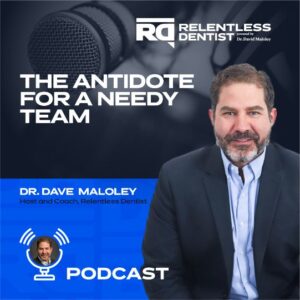
“If we learn to diagnose these needs and treat them accordingly, we’ll have our next level of freedom readily available to us.”
Can you pick out the dominant need in your team, patients, family, and friends? This exercise is very challenging, especially to dental practice owners wearing multiple hats — juggling the demands of the business, the employees, and the clients.
In this episode, I will discuss the six human needs rooted in the deepest of our nature. We require to discover, embrace, and fulfill these needs within ourselves to help us understand what fuels our team so we can respond to them better.
Tune in and find solutions to common practice issues at Prescriptions for Your Practice.
Key Quotes:
- “All teams are needy and all doctors are needy.”
- “Needs must be distinguished from wants. In case of needs, deficiency causes a clear adverse outcome.”
- “Typical management tactics have us treating employees more like human doings than human beings.”
- “If we embrace these 6 human needs (Certainty, Variety, Significance, Connection, Growth, Contribution), we can confidently influence, align, and predictably increase employee buy-in and engagement.”
- “When a team member comes to you and you feel like they’re whining, or they’re negative, you must filter out if they are just telling you an unmet need that they have that keeps them from a higher level of performance.”
Featured on the Show:


by [email protected] | Jul 7, 2021 | Prescriptions for your Practice
Podcast: Play in new window | Download
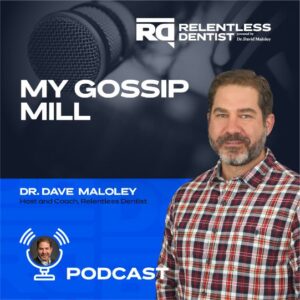 “Great minds discuss ideas; average minds discuss events; small minds discuss people.” — Eleanor Roosevelt
“Great minds discuss ideas; average minds discuss events; small minds discuss people.” — Eleanor Roosevelt
Many people find gossiping fun, enjoyable, and addictive until they become the focus of the idle talk. However, in a professional setup like the dental workplace, gossipmongering is an enormous time and productivity waster, not to mention unprofessional. In addition, it increases anxiety among employees, puts a strain on teamwork, erodes trust, and crushes morale.
Listen in as I provide steps on dispelling gossip before it enters the workplace, how dental owners should foster a culture of healthy conflict, and how to maintain an environment of high candor, high trust, and straightforward verbal communication.
Tune in and find solutions to common practice issues at Prescriptions for Your Practice.
Key Quotes:
- “I created a team training called “The 5 Habits That Destroy Team Unity” and we talk about it as a team.”
- “A lot of gossips comes from envy and jealousy.”
- “Gossip becomes addictive. Left to its own devices, it’s gonna run rampant, it’s gonna hijack your vision, it’s gonna destroy your well-being as doctors, it’s gonna divide team members, it’s gonna create unnecessary dramas, and none of that contributes to patient care.”
- “We want in a culture is a healthy conflict.”
- “We can create a team environment of high candor, high trust, and very direct verbal communication.”
- “Healthy conflict drives results without having to babysit the culture or nudging people to actually do their job.”
Featured on the Show:
- Dave Ramsey, Ramsey Solutions
- Newsletter: Does your practice have a Halftime? (See footer and subscribe to our email list to get the weekly newsletter.)
- I appreciate your feedback. Let me know what you learned and loved here: [email protected].


by [email protected] | Jun 30, 2021 | Prescriptions for your Practice
Podcast: Play in new window | Download
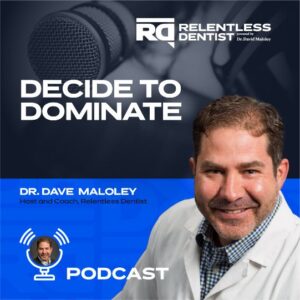
Decide to Dominate
Results are going to come from taking action. And all action starts with a decision.
Having to decide on something is naturally hard, most especially if the decision is transformative. However, decisive leadership is vital to effectively execute the plan of action toward achieving the organization’s goals.
This week’s podcast is about creating a culture of decisiveness, how to empower your team to make more and better decisions, the elements that make up a sound decision, and its impact on the organization’s overall well-being. We will also look into the psychology of “learned helplessness” — a situation where people deliberately put out a minimum viable effort to avoid trouble due to a vague instruction from a high-performance-seeking indecisive leader.
Tune in and find solutions to common practice issues at Prescriptions for Your Practice.
Key Quotes:
- “What was the number 1 characteristic of a high-performance culture or a high-performance team? I said immediately, DECISIVENESS.”
- “Decide to dominate. For me, dominate means dominating a day, knowing that we have, as a dental team, control over the day and an opportunity to get better than we were yesterday.”
- “If we’re not decisive, we can expect that our teams will also be indecisive.”
- “If we want results, we need to be decisive.”
- “If a team is consistently making more and better decisions across the board, it’s bound to generate more revenues, more fulfillment, and less stress.”
- “The quicker we make these decisions, the better off we’ll gonna be, the better off the organization is gonna be, and now we start to see the organization reflect the leader and become more decisive.”
- “We need to encourage our people to make mistakes and learn from them.”
- “The best thing you can do for your team is giving them reasons to stay hopeful and optimistic.”
Featured on the Show:


by [email protected] | Jun 23, 2021 | Prescriptions for your Practice
Podcast: Play in new window | Download
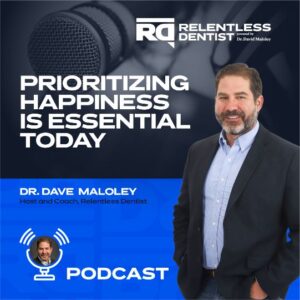
Prioritizing Happiness Is Essential Today
Money won’t make you happy, but happiness will make you money.
At this point in your life, you must be able to distinguish pleasure from happiness. Although both bring joy and good feelings, they produce contrasting outcomes. Pleasure is momentary and visceral, while happiness is long-lasting and transcendental.
Listen in as I dig deeper into the realities of happiness. We will talk about positive psychology and the narcissism epidemic brought about by the disruption in social media. We’ll also look at how we can prioritize happiness, what it looks like tactically, and what you can do to guarantee a culture of happiness in your practice.
Tune in and find solutions to common practice issues at Prescriptions for Your Practice.
Key Quotes:
- “How do we get so unhappy? This is not an ok thing to do, but it almost becomes a norm.”
- “We see it on social media all of the time where people lose their minds and hurt people. They unleash on someone else in a situation that doesn’t call for it.”
- “We need to figure out ways not only to get to function but how do we get to high function.”
- “Most of my adult life, I spent on this “I’ll be happy when” treadmill.”
- “I need to supplement my natural behaviors with tools that allow me to enjoy the day and the now and be more present.”
- “The one thing that’s taking us down right now is technology.”
- “We’re utilizing technology tools to help leverage and make our lives better, but if we’re not careful, it can be super destructive.”
- “Social media, the more we use it, the lonelier we get. We call it social, but it’s not social at all.”
- “In a dental practice, the five people that most likely you will spend your time with are the people on your payroll, so you have to be very selective.”
- “Happiness is a continuum.”
Featured on the Show:


by [email protected] | Jun 16, 2021 | Prescriptions for your Practice
Podcast: Play in new window | Download
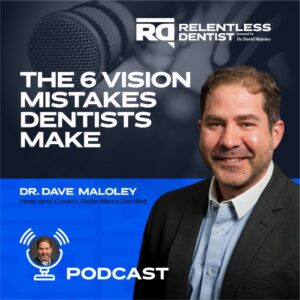 In this episode, I will expound on The 6 Vision Mistakes Dentists Make. I will discuss how crafting a clear vision supports the team’s growth and reinforces the practice effectively.
In this episode, I will expound on The 6 Vision Mistakes Dentists Make. I will discuss how crafting a clear vision supports the team’s growth and reinforces the practice effectively.
More than ever, dentists need to have a well-defined mission and a compelling vision to reinforce their practice, not only for themselves but also for their staff and patients. It provides a clear and consistent direction as to where the practice is going.
Faced with many challenges aggravated by these uncertain times, dentists need to run a successful business to avoid plateaus. One key aspect of strengthening the business is value-creation among the team steered by a well-executed vision. It has to be big enough to fit all of the employees’ dreams and hopes in it.
What does your practice look like five years from now?
Tune in and find solutions to common practice issues at Prescriptions for Your Practice
Key Quotes:
- “It’s important that we have a vision and we execute that properly.”
- “Execution without vision creates friction.”
- “Your vision has to be big enough to fit all of your employees’ dreams and hopes in it.”
- “Being flexible and strategy is important once we define our mission and our vision.”
- “Vision needs to stir excitement and emotion.”
- “We need to evolve as humans.”
- “We need to grow our practice by growing our people.”
- “Make sure that you’re willing to become something much more.”
Featured on the Show:


by [email protected] | Jun 9, 2021 | Prescriptions for your Practice
Podcast: Play in new window | Download

Mild to moderate obstructive sleep apnea (OSD) can lead to a wide variety of health risks. Yet, more than 80% of people with OSD are utterly unaware that they are suffering from this condition.
In today’s episode, I am very excited to have Kirk Huntsman, the CEO and Co-Founder of Vivos Therapeutics, Inc.; a medical technology company that focuses on developing a non-surgical, non-invasive, non-pharmaceutical, and low-cost solution for patients with sleep-disordered breathing, including mild to moderate sleep apnea.
Kirk is a well-known figure in the dental profession. In 1995 he founded Dental One Partners (formerly Dental One) and grew it to over 165 locations in 15 states. In 2010 he was appointed as CEO of ReachOut Healthcare America, and in 2012, Kirk founded Xenith Practices, LLC. He founded and served as the Chief Executive Officer of Ortho Ventures, LLC in 2014, and in November of 2015, he joined First Vivos, Inc. as its CEO.
Recently, Vivos launched VivoScore Diagnostic Technology. It is a comprehensive home sleep apnea test for children and adults. It includes a proprietary ring-like device that you can slide into your finger overnight while you’re sleeping in the comfort of your home.
If you want to take better care of your patients, you would be interested to listen to this episode.
Tune in and find solutions to common practice issues at Prescriptions for Your Practice
Key Quotes:
- “As I built a successful dental practice brokerage business, I quickly understood that dentists struggle with some of the clinical and managerial aspects.”
- “You want to differentiate your services offering from every other Yahoo in the marketplace. And so we were trying to figure out what we could do that was different.”
- “I decided I would take the orthodontic courses. I said, look, guys, you guys follow me, and I’ll do this with you. If I can do it, you can do it. “
- “I was probably the only business guy on the planet that had the clinical perspective, as well as the business background.”
- “The doctors have got to feel confident enough in the technology and competent enough with it that they can go into the operatory, sit down with the patient, close the case and never look back. The patient will have a great experience, and they’re [doctors] going to have a great experience.”
- “You don’t need to be in intervention for a lifetime. Would you rather have a mandibular advancement case that you’re married to for life, or would you rather have the opportunity to celebrate victory in 12 to 18 months and be done with that case?”
- “I appreciate how this all comes together and adding quality and quantity of life for patients and family members.”
- “ADA has recommended that all dentists screen all their patients for sleep apnea. That’s now becoming the standard of care.”
Featured on the Show:






 “Great minds discuss ideas; average minds discuss events; small minds discuss people.” — Eleanor Roosevelt
“Great minds discuss ideas; average minds discuss events; small minds discuss people.” — Eleanor Roosevelt


